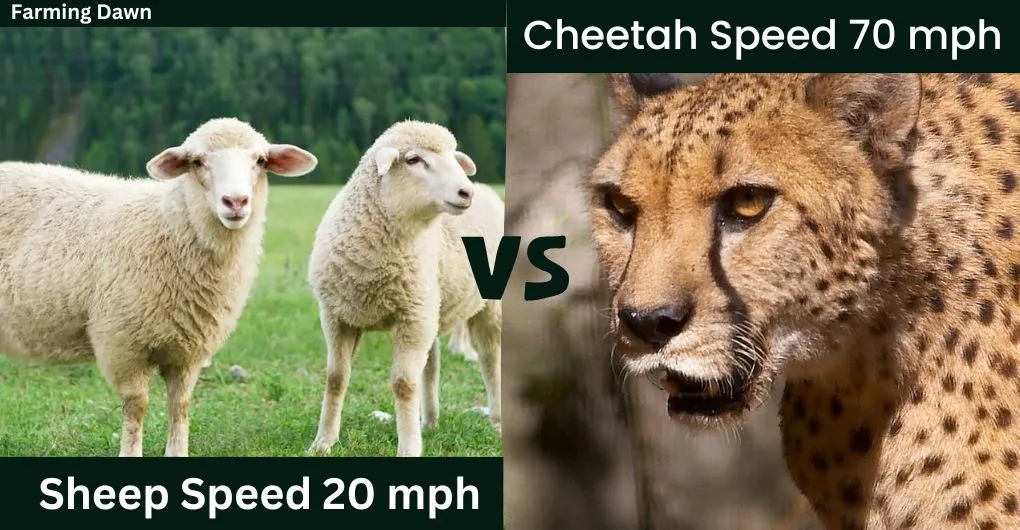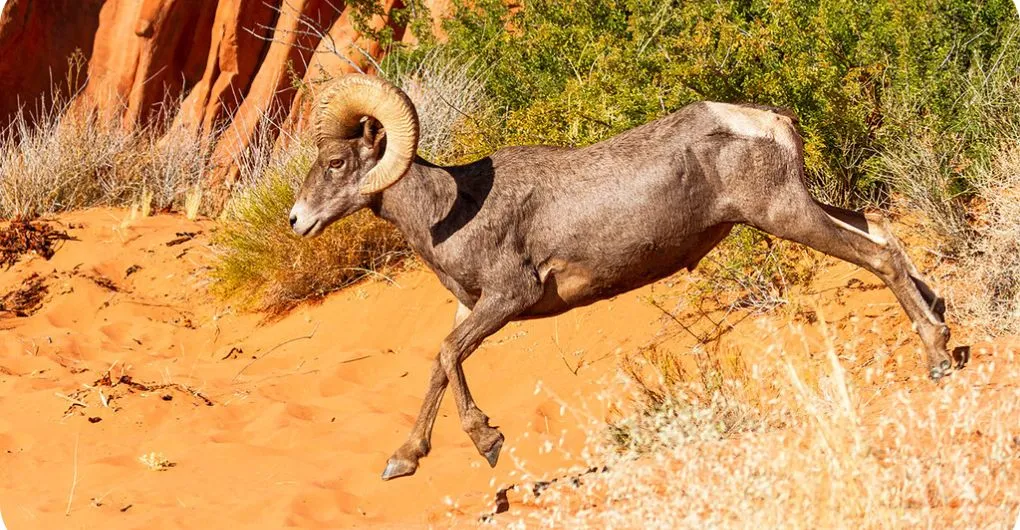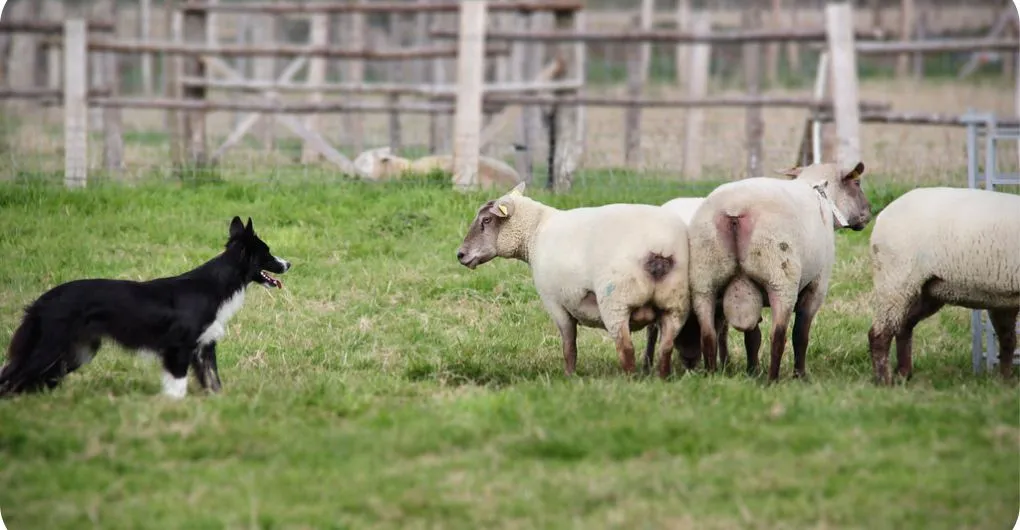As a farmer, you must have spent countless hours observing the behavior of these woolly creatures known as sheep. One question that might have come to your mind is “How fast can sheep run?” Sheep are naturally active animals, and they can run quite fast when they need to.
The average speed of a sheep is around 5-6 miles per hour. Today I will discover the factors that influence the speed of sheep, the benefits and risks of running, their running records, and some fun facts about sheep.
How Fast Can A Sheep Run? Explained
When not attempting to flee from predators, sheep can run at an average pace of 15 miles per hour, but when they are in danger, they can move much faster. Sheep have the ability to run at a speed of about 20 to 25 miles per hour when attempting to flee from a predator (32-40 kilometers per hour).
It’s crucial to remember that sheep aren’t renowned for being swift. As prey animals, they don’t outrun predators; instead, they use their flocking behavior and camouflage to hide from them.
Rams can gallop uphill at 15 miles per hour and can charge at 20 miles per hour or even faster, according to Defenders of Wildlife.
Sheep would prevail over humans in a sprint race due to the advantage of their four limbs. But in a long-distance race, humans can outrun practically all other species.
Four-legged animals can sprint faster than two-legged creatures like humans because their trunk muscles enable them to gallop and propel themselves ahead.
Comparing Sheep Running Speed to Other Animals
Sheep are relatively fast runners as compared to cows, pigs, and chickens. Sheep can move at a maximum speed of 20 miles per hour. This is faster than cows and pigs, and even chickens. Chickens have a top speed of 9 miles per hour. The ability of chickens is not their speed but the power to turn on a dime.
Let’s now discuss wild animals. Sheep are not particularly good runners when compared to certain wild animals. For instance, cheetahs are the fastest land mammal due to their 70-mph top speed. Even the typical house cat is capable of running up to 30 mph. However, sheep can still outrun some predators, including wolves and coyotes.

How Fast can a Ram run?
A ram is a powerful and agile animal capable of rapid acceleration. A ram’s max speed is actually up to 40 miles per hour. The amazing speed is due to the ram’s powerful body and muscular legs, which let it cover great distances swiftly.
Rams are renowned for their exceptional physical strength, and this is especially noticeable in their propensity for fast running. Whether they are fleeing from predators or pursuing mates during mating season, rams depend on their speed to survive and thrive in their natural environment.

How Far can Sheep Walk in a Day?
A healthy sheep can go up to 10 to 12 miles per day on average. However, certain sheep breeds are known to walk up to 20 miles each day. The distance a sheep can travel in a day depends on many variables, including the terrain, the climate, the lifespan of sheep, and it’s size.
Sheep are not built to move quickly over vast distances, unlike other animals like camels. They move more slowly and like to graze and rest sometimes. Thus, even though sheep can cover a lot of ground in a day, they are not designed for endurance.
The amount of time and distance a sheep can move in a day depends on several different factors, including the availability of food and water. A sheep may be able to travel farther if it has easy access to food and water than if they were deprived of these resources.
What Influences the Speed of Sheep?
Legs-to-Body Ratio
The ratio of a sheep’s legs to its body has a big impact on how fast it moves. Sheep having proportionately longer legs than their body size can move faster than those with shorter legs. Longer legs enable sheep to move more efficiently and cover more distances in a given amount of time.
Small Lungs
Sheep have teeny little lungs in comparison to the size of their bodies. This demonstrates that they have a limited capacity for oxygen uptake, which affects their stamina and overall speed. Because of their smaller lungs, sheep must breathe more repeatedly each minute, which can cause them to become exhausted more quickly.
Dense Wool
The density of a sheep’s wool can also have an impact on its speed. Sheep with denser wool can easily overheat, which can cause slow speed. Many sheep breeds have been created to have finer, less dense wool to enhance heat dissipation and increase speed.
Do Sheep Run Away from Predators?
Yes, sheep run away from predators. In fact, sheep follow each other in form of a group to sense danger and to keep themselves alert.
Here, I would like you to remember that sheep have been domesticated for thousands of years and they may behave differently from their wild counterparts. They may not have the same instincts as wild sheep because they have grown to rely on people and other animals for protection. Because of this, it is essential to take the required steps to keep them safe and protected from predators.
Sheep run away from predators through avoidance, their social behavior, and with the assistance of guard dogs.
Avoidance and Running
Sheep are well renowned for avoidance and running abilities when it comes to a predator. Their innate instinct is to run away from any threat and avoid any risk. They can survive in the wild and avoid becoming prey thanks to this instinct.
Social Behavior
Sheep are renowned for being gregarious. This behavior helps them to look out for one another and boosts their chances of survival when encountering predators. Also, it makes it simpler for them to recognize any danger and flee right immediately. One of the most prominent aspect of their social behavior is sheep headbutting with each other. they headbutt to shoe dominance and hierarchy in the group.
With the Assistance of Guard Dogs
The best approach to help sheep defends themselves from predators is with guard dogs. These dogs have been trained for livestock defense against wolves, coyotes, and even bears for many years. They have a deep urge to keep their flock safe and will go to any lengths to protect them.
Why Do Sheep Run from Dogs?
Sheep have a survival mechanism and specific behavior hardwired into their genetics that allows them to avoid danger in the wild.
A sheep’s natural fight-or-flight response is triggered when it sees a dog. The sheep will typically decide to flee rather than fight. This is because sheep are not designed to defend themselves against natural predators like dogs.
Furthermore, dogs are also known to have a prey drive that is naturally present in them and can be triggered when they observe a flock of sheep. This can cause them to chase and maybe harm the sheep, which is why sheep naturally flee when they encounter a dog.

The mere sight of a dog can be enough to frighten sheep and make them flee, even if it poses no threat. This is because sheep are delicate creatures who are prone to anxiety or tension.
Here, I want to make a clarification, not all canines frighten sheep. Sheep can be trained to recognize and accept certain dogs, such as herding dogs that are used to manage the flock. These canines have a different energy than dogs that are considered to be predators since they have been trained to work with sheep.
9 Facts about sheep
Upper teeth are absent in sheep
Sheep are toothless in the upper front. To grind their meal, they instead utilize a strong dental pad.
The top speed of a sheep is 20 mph
Sheep are very quick runners considering their placid nature. When they have to flee from predators, they may achieve speeds of up to 20 miles per hour.
Sheep hate water
Sheep don’t like to get wet. They don’t like water and try to stay away from it. If they get too wet, they may get stressed.
Sheep always try to run uphill
Sheep have a reputation for being superb climbers. They frequently choose to go uphill when given the option because it helps them avoid predators.
Sheep have nearly circumferential vision
Sheep have a relatively broad field of vision, which aids in their ability to spot potential predators. They don’t have to look in that direction to view practically everything around them.
Sheep enjoy delicious things
You wouldn’t believe it, but sheep-like sweet stuff. They adore eating fruits and veggies, and if given the chance, they’ll even eat candy!
Contrary to popular belief, sheep are not naïve
As commonly believed, sheep are not unintelligent animals. They have quite good memories and can recognize other sheep and recall faces for years.
Sheep are waterproof
When I say waterproof, it does mean that they like water. Sheep’s wool contains a natural waterproofing component that keeps them dry in the wettest weather. This material, lanolin, is also a common ingredient in cosmetics.
Sheep sleep for almost 4 hours per day
Sheep are not very busy creatures and don’t require a lot of sleep. They sleep for roughly 4 hours every day on average, usually in short stretches throughout the day and night.
Sheep Running Records: Fastest sheep in World
The fastest recorded speed of a sheep is 55 mph. The record was set in 2018 by a sheep named Zippy. Zippy was a 3-year-old New Zealand Merino ram. He was part of a study run by academics at the University of Texas. The goal of the study was to discover the top speeds of different animals, including sheep.
Zippy was trained by running on a treadmill for several months to break the record. To get Zippy to reach his top speed of 55 mph, the researchers steadily increased the pace. After that, Zippy was given a unique tracking collar that could gauge his movement and distance.
Given that sheep are not normally recognized for their speed, the world record speed of 55 mph is impressive. In actuality, a sheep moves at a pace of 6 to 8 mph. They are not built for speed, as evidenced by their hefty, massive bodies.
The examination of the record demonstrates that several variables contributed to Zippy’s speed. These elements include
- Breed of sheep —Merino sheep are renowned for their athleticism
- Age of sheep—three years old is thought to be the ideal age for sheep
- Training of sheep (which included both physical and mental conditioning)
How Fast Can Sheep Run? Final Remarks
Hence, next time you find yourself wondering how fast can sheep run, just remember, these woolly wonders are capable of more than meets the eye. Excluding the factors such as breed and terrain it’s safe to say that most sheep can reach speeds of up to 20-30 miles per hour.
However, it’s important to remember that sheep are not typically used for racing or other high-speed activities. The information provided was authentic and taken from reliable resources. Hope you liked reading this post. Thank you!





